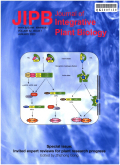- 钛学术文献服务平台 \
- 学术期刊 \
- 基础科学期刊 \
- 生物科学期刊 \
- 植物学报(英文版)期刊 \
Ca2+ signaling in plant responses to abiotic stresses
Ca2+ signaling in plant responses to abiotic stresses
基本信息来源于合作网站,原文需代理用户跳转至来源网站获取
摘要:
Adverse variations of abiotic environmental cues that deviate from an optimal range impose stresses to plants.Abiotic stresses severely impede plant physiology and development.Con-sequently,such stresses dramatically reduce crop yield and negatively impact on ecosystem stability and composition.Physical components of abiotic stresses can be,for example,suboptimal tem-perature and osmotic perturbations,while repre-sentative chemical facets of abiotic stresses can be toxic ions or suboptimal nutrient availability.The sheer complexity of abiotic stresses causes a multitude of diverse components and mecha-nisms for their sensing and signal transduction.Ca2+,as a versatile second messenger,plays multifaceted roles in almost all abiotic stress re-sponses in that,for a certain abiotic stress,Ca2+ is not only reciprocally connected with its percep-tion,but also multifunctionally ensures sub-sequent signal transduction.Here,we will focus on salt/osmotic stress and responses to altered nutrient availability as model cases to detail novel insights into the identity of components that link stress perception to Ca2+ signal formation as well as on new insights into mechanisms of Ca2+ signal implementation.Finally,we will deduce emerging conceptual consequences of these novel insights and outline arising avenues of future research on the role of Ca2+ signaling in abiotic stress re-sponses in plants.

推荐文章
苹果柱头Ca2+分泌和膜结合态Ca2+分布
苹果
柱头
Ca2+
授粉
Ca2+与果树抗逆性的关系(综述)
Ca2+
果树
抗逆性
Ca2+含量对微粒释放的影响
微粒释放
水敏感性
临界离子强度
多孔介质
Ca2+和Mg2+对喹啉反硝化降解特性的影响
钙离子
镁离子
反硝化
喹啉
生物降解
内容分析
关键词云
关键词热度
相关文献总数
(/次)
(/年)
引文网络
引文网络
二级参考文献 (0)
共引文献 (0)
参考文献 (0)
节点文献
引证文献 (0)
同被引文献 (0)
二级引证文献 (0)
2022(0)
- 参考文献(0)
- 二级参考文献(0)
- 引证文献(0)
- 二级引证文献(0)
引文网络交叉学科
相关学者/机构
期刊影响力
植物学报(英文版)
主办单位:
中国植物学会
出版周期:
月刊
ISSN:
1672-9072
CN:
11-5067/Q
开本:
大16开
出版地:
北京香山南辛村20号中科院植物所内
邮发代号:
2-500
创刊时间:
1952
语种:
eng
出版文献量(篇)
3621
总下载数(次)
1
总被引数(次)
74646
期刊文献
相关文献
推荐文献
- 期刊分类
- 期刊(年)
- 期刊(期)
- 期刊推荐
力学
化学
地球物理学
地质学
基础科学综合
大学学报
天文学
天文学、地球科学
数学
气象学
海洋学
物理学
生物学
生物科学
自然地理学和测绘学
自然科学总论
自然科学理论与方法
资源科学
非线性科学与系统科学
植物学报(英文版)2022
植物学报(英文版)2021
植物学报(英文版)2020
植物学报(英文版)2019
植物学报(英文版)2018
植物学报(英文版)2017
植物学报(英文版)2016
植物学报(英文版)2015
植物学报(英文版)2014
植物学报(英文版)2013
植物学报(英文版)2012
植物学报(英文版)2011
植物学报(英文版)2010
植物学报(英文版)2009
植物学报(英文版)2008
植物学报(英文版)2007
植物学报(英文版)2006
植物学报(英文版)2005
植物学报(英文版)2004
植物学报(英文版)2003
植物学报(英文版)2002
植物学报(英文版)2001
植物学报(英文版)2000
植物学报(英文版)1999
植物学报(英文版)1998

 免费查重
免费查重










